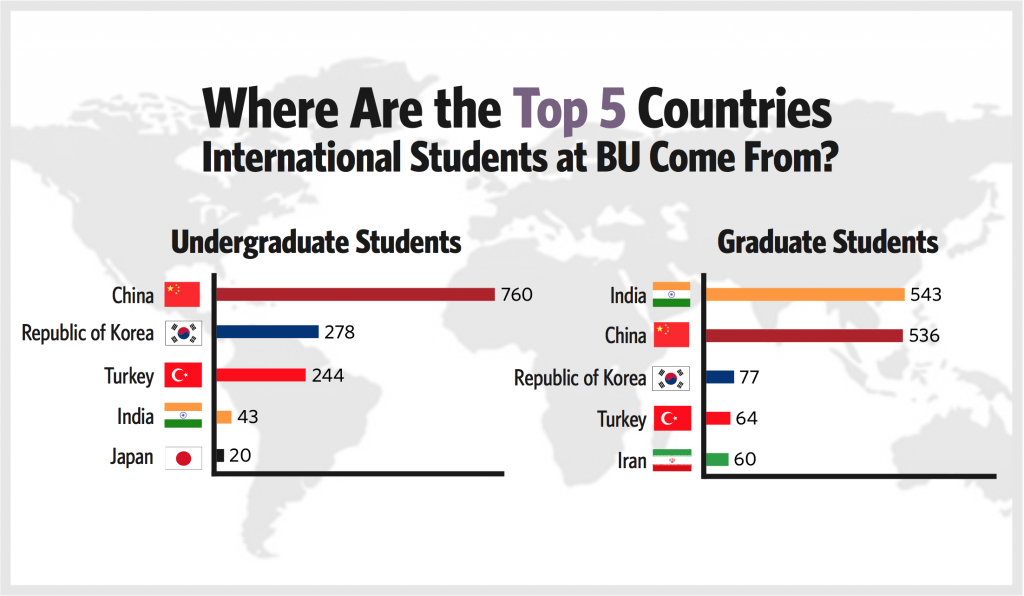
According to Binghamton University Undergraduate Admissions, over 115 countries are represented throughout the student body, and international students account for about 15 percent of the total student population at BU.
According to Nasrin Fatima, assistant provost for institutional research and effectiveness, as of fall 2016 there are 1,211 total undergraduate international students and 1,511 total international graduate students.
China is the most represented country in undergraduate students, with 760 Chinese students attending BU. The Republic of Korea ranks second with 278 undergraduates, and Turkey, India and Japan round out the top five, respectively.
Most graduate students come from India, at 543 students, and China, with 536. The Republic of Korea, Turkey and Iran make up a large portion of international graduate students at the University as well.
On the undergraduate level, Pat Wrobel, an international undergraduate student recruiter, said that the University works hard each year to attract students from across the world, and get the University’s name out on the global scale.
Packets are sent to high school counselors in various countries, and the admissions office sends recruiters to high schools and fairs across the world each fall to tell students firsthand what they can find at BU. High school counselors also attend reverse conferences in the United States to find out about universities, and BU recruiters frequently host and attend. EducationUSA, a U.S. Department of State education advising organization, as well, has offices in almost every country to advise international students on which U.S. universities would be the best fit for them.
According to Wrobel, it is this word of mouth, as well as an extensive alumni network, that is the most useful tool in recruiting international students.
“I’m always surprised at the amount of alumni we have teaching across the world,” Wrobel said. “I was in Vietnam at a high school fair, and the vice principal was a SUNY Albany graduate, and he yelled out, ‘Check out the Binghamton table!’ People know us and can speak personally about how our school is regarded … it takes a village.”
Rankings on U.S. News & World Report also aid in getting BU’s name out there, Wrobel said, as the University has ranked in the top-100 best universities in the United States for the past few years. Online resources are highly utilized as well, because most international students don’t visit the University before choosing to attend.
“Some travel to see our institution, but some do not,” she said. “So things like YouTube videos, social media, like our Facebook page for international students … we try to put a lot of information out about this University on all levels so students can get a feel of how it is here.”
Weicheng Yuan, a senior from China double-majoring in psychology and math, found out about BU from an independent agency in China and online ranking. He said that even before he came to BU, the University’s outreach was valuable in helping him adjust.
“The year before we came, we were given a booklet on how to get plane tickets, how to get a bus from [John F. Kennedy International Airport] to Binghamton, how can we find a house and choose housing,” Yuan said. “So they gave a lot of information to me, and they’re still doing that to new students.”
Woo Hwi Joo, a junior majoring in philosophy, said that he heard of BU from his high school advisers, and although it wasn’t his first choice, he enjoys the University.
“There was a counselor for college who told me you need to apply to a lot of colleges; originally I wanted to go to California, so I applied to six schools there,” Joo said. “But she said that people make mistakes, so I needed a safety, and I applied to Binghamton. I got the results and I didn’t get into California schools but I did get into BU, and now that I’m here I like it.”
When counting the total number of international students, Wrobel said the University classifies them as students who come to BU with an F-1 Visa. However, because some students transfer schools, or have different visas or are permanent residents, BU is actually more diverse than it appears on paper.
“We’re a medium-sized University; to have about 15 percent of your student body be international is quite good,” Wrobel said. “This is a really good thing, because we live in a global society, and it’s important that students get to know people from other cultures. It’s always good to understand the differences, and also see the similarities.”


